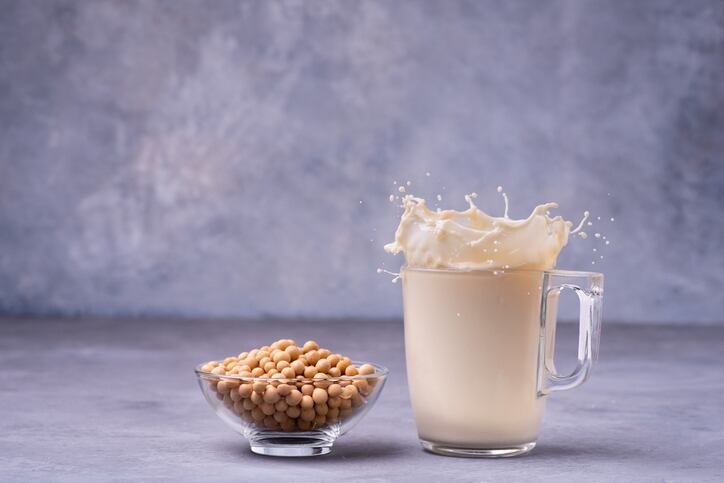The systematic review and meta-analysis of 18 randomised controlled trials (RCTs) showed that consumption of soy milk significantly reduced systolic and diastolic blood pressure, total and low-density lipoprotein cholesterol, waist circumference, C-reactive protein, and tumor necrosis factor-alpha.
This suggest that soy milk consumption can provide favourable effects on several cardiometabolic risk factors in both healthy and unhealthy individuals compared with a control group.
Soy milk contains isoflavones and polyphenols which can exert beneficial effects on the cardiovascular health.
However, most research on the beneficial effects of soy milk on several cardiometabolic risk factors are done on people with non-alcoholic fatty liver disease (NAFLD) and type 2 diabetes mellitus patients. Even then, studies have reported contradictory results.
Also, many studies tend to administer soy milk in combination with other compounds such as phytosterols.
Researchers said whole soy and soy milk contain phytosterols, essential fats, plant amino acids, phytosterols and isoflavones which are effective in positively impacting human health.
“To the best of our knowledge, this is the first systematic review and meta-analysis that scrutinised the impact of soy milk consumption specifically, as opposed to other soy products, on cardiometabolic risk factors,” researchers wrote in the Journal of Functional Foods.
They added: “Soy milk consumption is an appropriate strategy to reduce the risk of cardiometabolic diseases. However, further research is recommended to shed light on these findings.”
Study design
This study included 18 RCTs, comprising a total of 665 individuals, between 18 to 65 years old.
Data was retrieved from online databases and included RCTs conducted in Iran, USA, Sweden, Japan, Nigeria, UK and Spain.
All studies consisted of soy milk as the intervention group, and a placebo or cow milk group as the control. Their outcomes include body weight, body mass index (BMI), waist circumferences, systolic blood pressure, diastolic blood pressure, total cholesterol, low-density lipoprotein cholesterol, high-density lipoprotein cholesterol, triglycerides, fasting blood glucose, insulin, C-reactive protein, tumor necrosis factor-α, interleukin 6, and fibrinogen.
Studies that administered soy milk in combination with other compounds such as phytosterols were excluded.
The duration of the intervention varied from four to eight weeks and the amount of soy milk consumed ranged between 240 and 1000 ml/day.
This study included both healthy and subjects diagnosed with several cardiometabolic diseases (NAFLD, diabetic nephropathy, hypercholesterolemia, rheumatoid arthritis, hypertension) as well as overweight and obese individuals.
Blood pressure
According to the findings, soy milk consumption can provide favourable effects on blood pressure compared to a control group.
Five RCTs indicated that soy milk intake significantly decreased systolic blood pressure (p<0.001) and diastolic blood pressure (p=0.002).
The blood pressure-lowering effects of soy milk can be largely attributed to its composition in isoflavonoids, namely genistein and equol as a metabolite of daidzein, both of which have exerted vasorelaxant and diuretic activities in in vivo studies.
Moreover, soy milk contains bioactive peptides that counteract the activity of the angiotensin-converting enzyme (ACE) and stimulate the activity of bradykinin, decreasing thus blood pressure.
“Based on our findings, soy milk reduced systolic and diastolic blood pressure and we may hypothesise that it can be combined with conventional antihypertensive drugs in clinical practice in order to manage hypertension.”
“Even a reduction of 2 mmHg in systolic and diastolic blood pressure can decrease ischemic heart disease-related and stroke-related mortality by 7% and 10% respectively.”
The study also found a greater effect of soy milk consumption on lowering blood pressure when administered for less than four weeks, which researchers said may be due to the effects of soy on microbiota composition.
It is believed that soy in the long run may cause an imbalance of intestinal microbiota by reducing the abundance of beneficial intestinal bacteria as well as increasing the production of trimethylamine-N-oxide, which may not be beneficial to intestinal health. Previous studies have shown an association between microbiota imbalance and impaired blood pressure regulation.
Soy milk intake in the long run reduces the absorption of micronutrients useful in lowering blood pressure, such as magnesium.
In addition, the metabolic components of soy, such as genistein, which are responsible for the antihypertensive effects, have a very short half-life that may lose its beneficial effects in the long run.
Lipid profile
Based on the results, soy milk consumption also significantly reduced some lipid profile parameters, mainly total cholesterol (p=0.001) and low-density lipoprotein cholesterol (p=0.041) compared to a control group.
However, soy milk intake did not reduce serum triglycerides and high-density lipoprotein cholesterol concentration.
Anthropometry
The findings also revealed that soy milk significantly lowered waist circumference compared to the control group (p=0.005).
An increased waist circumference reflects an accumulation of visceral fat and overexposure of the liver to fatty acids, and can be involved in the development of insulin resistance as well as influence the lipid profile.
Although, there was no significant difference in other anthropometric indices such as body weight and BMI.
Researchers explained this effect could vary based on the age, the gender of the participants, the consumption dose, the type of soy products employed, the duration of the intervention, as well as the anthropometric indices at baseline.
Inflammation markers
According to the findings, soy milk consumption significantly reduced C-reactive protein (CRP) (p<0.001) and tumour necrosis factor α (TNF-α) (p=0.016) compared to the control group.
There was no significant effect on interleukin 6 (IL-6) and fibrinogen.
Inflammation is marked by an increased expression of pro-inflammatory cytokines such as TNF-α and IL-6, leading to the progression of cardiovascular diseases and even mortality.
Soy isoflavones harbour estrogen-like actions which interfere with the generation of TNF-α and IL-6.
However, whether the magnitude of reduction is enough to cause a physiological benefit remains unclear.
“Further research is needed to explore in which subjects soy milk may show increased benefits and whether the administration of this product should be tailored according to certain clinical features or demographics, for example glycemic status.”
There was no significant impact of soy milk on fasting blood glucose and fasting insulin.
Limitations
“Overall, our results reinforce that soy milk should be integrated in the diet, owing to its favourable outcomes on blood pressure, serum lipids, inflammatory markers and anthropometric parameters.”
However researchers acknowledged several limitations in the study, including the small number of RCTs and sample sizes which mostly enrolled women, hence the results might not be generalisable to men
In addition, the compliance to the soy milk intervention was not quantitatively verified by examining the serum or urinary levels of soy isoflavones.
Researchers recommended future research on larger samples to confirm these findings.
Source: Journal of Functional Foods
https://doi.org/10.1016/j.jff.2021.104499
“Impact of soy milk consumption on cardiometabolic risk factors: A systematic review and meta-analysis of randomized controlled trials”
Authors: Mohammad Hassan Sohouli, et al.
We’ll be shining the spotlight on Healthy Ageing: Metabolic & Digestive Health in our Growth Asia 2021 interactive broadcast series, featuring expert insights from a host of big-name brands and world-renowned experts. Register for free here.




